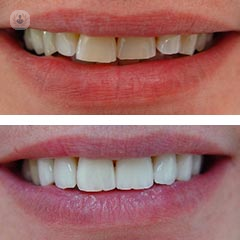How do veneers work and how much do they cost?
Escrito por:Veneers are basically like false fingernails that fit over the front and the edge of the teeth. They are designed to enhance and improve the colour, size and shape of the teeth and they're one of the most commonly used cosmetic dentistry materials. Dr Mark Hughes, a leading cosmetic dentist, descirbes how veneers work and what makes them so intricate.

What are veneers and what are they made of?
Veneers can be made of two different materials; the first is porcelain and the other is composite resin. Porcelain is a glass-like substance, often called ceramic and porcelain veneers are the most life-like, the most durable and the prettiest form of veneer. They generally have to be made in the dental laboratory by one of our master ceramic technicians.
The other method is to use a composite resin, sometimes called bonding, and again, they can also be made in the laboratory, but very often they're done by the dentist chair-side. The dentist uses his artistry and his skill to build the veneer up directly onto the patient's tooth.
Will veneers look natural?
The look of veneers will depend on the skill of the dentist or the ceramic technician as well as the desires of the patient. Some of our patients want very natural, very aesthetic results, whilst other patients come and they want the Hollywood smile, or the most perfect set of white teeth. These veneers can look less natural and more cosmetic, but this is down to what the patient wants. However, the resulting appearance of the veneers comes down a lot to the skill of the craftsman making them.
Are veneers and caps the same thing?
Veneers and caps are generally not referring to the same thing. The traditional term ‘cap’ is usually referring to a crown which is something that completely envelops the whole tooth. It is a 360-degree wrap with complete enclosure of the tooth. A cap is very often done when the tooth is completely broken down and needs a major reconstruction. A veneer, however, like the term suggests is a very thin layer that fits just over the front of the tooth, so in essence, the bulk of the tooth structure is still intact. Veneers sometimes require very little or in some cases no tooth reduction or tooth preparation, but in most cases a very minimal tooth reduction is required, whereas a cap very often requires a lot of to structure to be removed first.
How much do veneers cost?
The cost of veneers depends on a lot of factors. The first is the type of veneer – porcelain and composite resin. Laboratory made porcelain veneers will carry an extra cost because of the fee that the dental technician will charge, whereas composite resin veneers often don't carry that fee and are usually about 50% of the cost of the porcelain veneers. The composite veneers can also be done in one visit usually, so you're not paying for as much of the dentist’s time.
Cost will also depend very much on quality of both the craftsmanship and the experience of the dentist. As in all professions there are very highly skilled masters in dental technicians and those that have less experience. The desire of the patient to have their veneers look as perfect as possible and the complexity or the difficulty of the case for that particular patient will also have a bearing on cost.
The number of veneers done per procedure will have affect cost too. For example, if you are having multiple veneers, usually the individual cost of the veneer comes down. Whereas, if you are having just a single veneer, the single tooth that has to be matched perfectly to a natural tooth next to it can be almost as costly as having two teeth done because of the difficulty in doing that procedure.
Therefore, the cost really varies and it will vary from person to person. As a ballpark, in southern England and London, a composite veneer will cost anywhere from £300 to £500 currently and you may pay anywhere from £700 to £1500 per tooth for a porcelain veneer.
If you are interested in dental veneers, make an appointment with a specialist.


